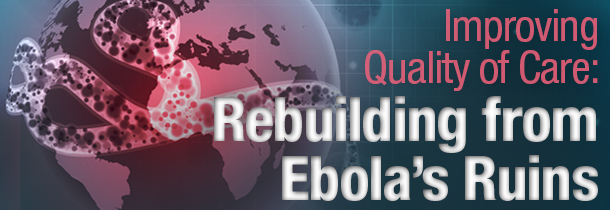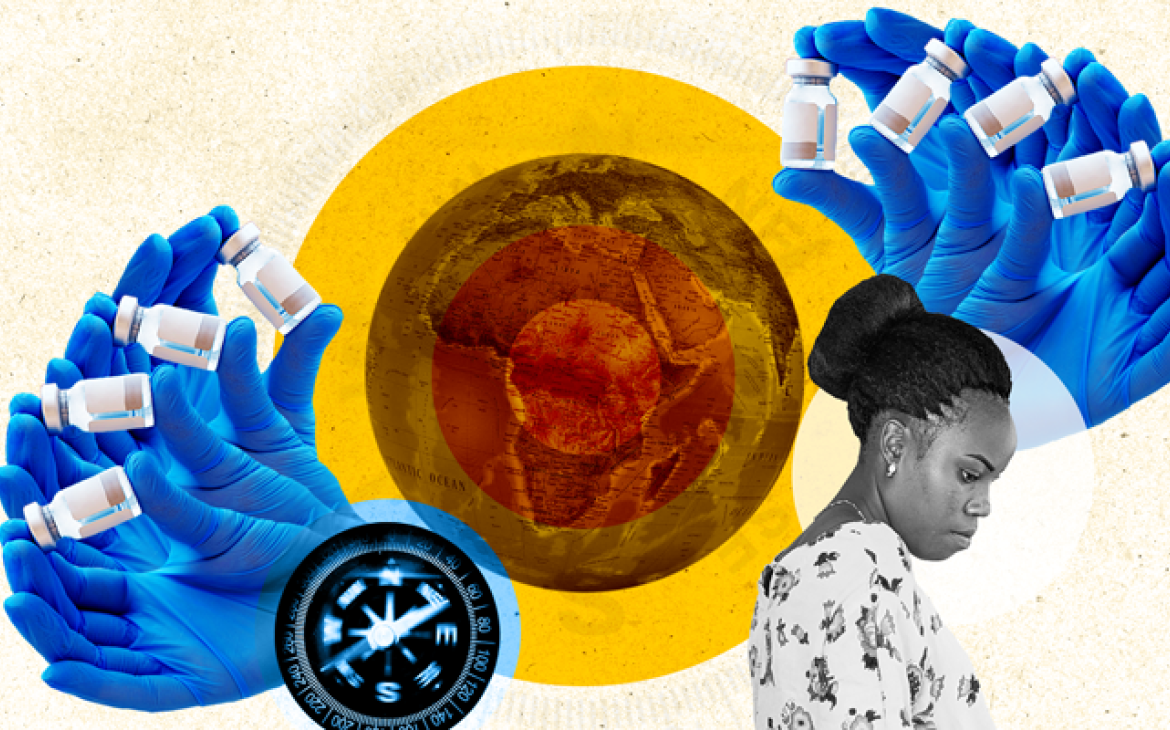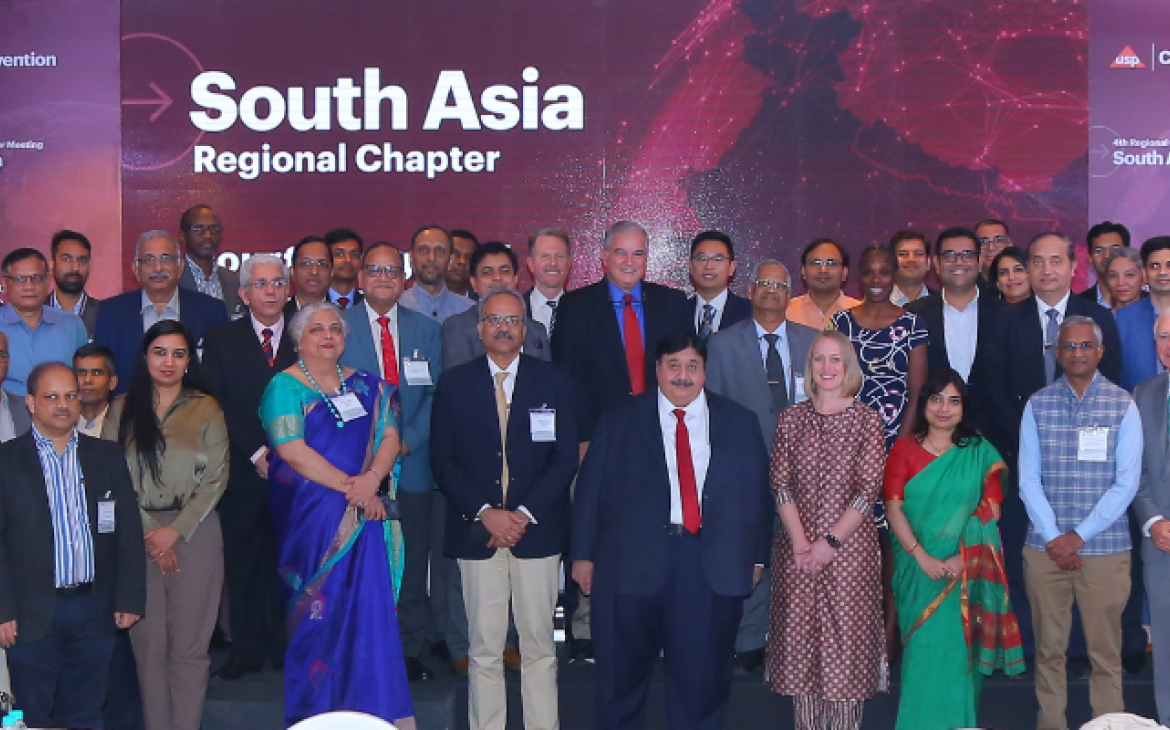
USP staff had the opportunity to hear an animated and truly captivating presentation by Dr. Ian Crozier, an infectious disease physician who was infected with Ebola while treating patients during the Ebola outbreak in West Africa last year.
Dr. Crozier’s firsthand account brought the 2014 Ebola epidemic to life in a way that no other medium has. Despite its immense size, when Ebola erupted, the world shrank. Around the world, many people, healthcare workers and health care systems were affected. Hearing Dr. Crozier’s story of how a tiny virus that nearly decimated West Africa’s healthcare infrastructure and claimed over 26,000 lives worldwide, including over 500 healthcare workers, yet miraculously spared his, not only wrenched hearts, but it made the world seem more smaller and vulnerable.
It also made disparate parts of the broad global public health field and the people who work in it seem more connected. Through his words and presence, Dr. Crozier brought the story of the epidemic and its aftermath to USP’s doorstep, which inspired many staff and solidified the conviction that these sorts of battles in many ways are ours to fight, too.
 Dr. Crozier’s eye-opening presentation was the first lecture in USP’s Global Public Health Speaker Series, which was launched to enhance perspectives and generate discussion on global public health issues. During his talk, he described his encounters with Ebola – first as a doctor, then as a patient, and now as a survivor recovering in the post-Ebola era. He shared several salient take-home messages from his experiences that are relevant to the entire field of global public health.
Dr. Crozier’s eye-opening presentation was the first lecture in USP’s Global Public Health Speaker Series, which was launched to enhance perspectives and generate discussion on global public health issues. During his talk, he described his encounters with Ebola – first as a doctor, then as a patient, and now as a survivor recovering in the post-Ebola era. He shared several salient take-home messages from his experiences that are relevant to the entire field of global public health.
The lessons he learned and the recommendations he provides for controlling and eliminating future infectious disease epidemics echo USP’s imperatives: ensuring the quality of care in a world united in its efforts to confront a virus that “disrespects international borders” and knows no boundaries.
Within Despair Lies Hope
Last August, Dr. Crozier, who was treating HIV patients in Kampala, Uganda at the time, volunteered with the World Health Organization (WHO) to help fight the erupting Ebola outbreak in Sierra Leone, a country that, to date, has experienced one of the most complex outbreaks in Ebola history. He joined a team of five health care workers that cared for nearly 100 patients daily at the Ebola Treatment Unit (ETU) at Kenema General Hospital.
While providing care in the ETU at Kenema, he witnessed the progression of the Ebola virus take its course in patient after patient. He described the “dignity robbing” pace of the disease—patients monitored during the morning’s rounds might be dead by the evening. Six to eight patients died per day; the primary cause of death was due to vomiting and diarrhea. The “virus danced between patients’ ears”, he said, disrupting their mental faculties, leaving many with “vacant encephalopathy” or a delirious feeling.
But in that despair, Dr. Crozier and his team saw many good things, including encouragement and hope. The tragedies brought many people together and he witnessed an “uncommon heroism” that he will never forget: “childless parents cared for parentless children; older brothers became parents, displaying remarkable resilience”; Nancy Yoko, his team’s head nurse, was the “glue that held together a group of anxious nurses”; and Will Pooley, a British volunteer nurse, worked tirelessly to build the capacity of the team before also infected with Ebola and getting evacuated to Britain where he was treated and successfully beat the virus.
When describing the care his team provided to patients, he quoted a proverb by William Osler, a British Canadian physician who was one of the founders of Johns Hopkins Hospital and renowned for his advocacy for bedside clinical training, good nursing, hygiene, and prevention: “The best preparation for tomorrow is to do today’s work superbly well.” This philosophy, in part, guided his team’s provision of care on the ground, at the bedside. They did the “simple things well,” he said, using a patient-centered approach, such as providing well-timed saline solution to dehydrated patients.
From Provider to Patient
A few weeks after his arrival, Dr. Crozier found himself on the opposite side of the examination table. On September 6, he developed a headache and fever. He drew his own blood for testing, quarantined himself at home and waited for the results. Soon, he was evacuated for treatment at Emory Hospital in Atlanta where he received care from the Serious Communicable Disease Unit’s “Team Ebola,” a group of 30 multidisciplinary, critical care healthcare workers. Arriving at Emory was the last thing he remembered for several weeks.
What he later read in his medical chart about his condition was a familiar history; Ebola had taken control of his faculties as it had done to so many of his patients who died: severe dehydration; rapid onset of delirium and encephalopathy; high fever; unrelenting cytokine storm; and respiratory, liver and kidney failure.
Dr. Crozier’s case was extreme. He harbored levels of virus 100 higher than any other Ebola patient treated in America. Had he not been flown to Emory, he is certain that he would have died within a week due to multiple organ failure. The groundbreaking care that he received at Emory, for which he expressed immense gratitude, was the medical equivalent of “walking on the moon.”
Eventually, he began to make antibodies to fight the virus, but it was not enough. Through a medical miracle, he got help from a familiar face, Will Pooley. Pooley had developed antibodies to the disease and flew to Emory to donate plasma to Dr. Crozier to boost his immune response. The novel therapy, called convalescent plasma therapy, was successful, and Dr. Crozier was discharged from Emory on October 19.
Recovering in the Post-Ebola Era
As an Ebola survivor, Dr. Crozier has a plan for rebuilding a region that was dismantled by Ebola and a vision for preventing and controlling future outbreaks. His experience as America’s sickest Ebola patient, coupled with his “post-Ebola syndrome”—a collection of symptoms that he has experienced post-infection that include prolonged vision loss, chronic fatigue, headaches, cognitive impairment, and hearing loss—sheds new light on the natural history of the virus.
Dr. Crozier has also learned that bodily fluids typically thought to be free of Ebola virus post-infection, such as ocular fluids, may still harbor the virus for a prolonged period of time. Although he was not contagious, Crozier was found to have Ebola virus in his ocular fluids several months later, which caused complications that include uveitis (ocular disease), and also changed one of his blue eyes to green. A journal article on Dr. Crozier’s case was published May 9 in The New England Journal of Medicines; a news story also appeared in The New York Times.
More bedside soldiers to provide quality, patient-centered care and a stronger health care infrastructure are needed to combat Ebola, a virus that Dr. Crozier says kills twice. It not only devastates a region’s healthcare system and staff, but also destroys the economy and civil society. The quality of care during epidemics has suffered, he says, in part because it has focused on isolating those affected. Instead, more focus is needed on providing quality care to infected patients.
To prevent this sort of devastation in the future, a “short-term band aid, a three to five-year fix” will not be enough. Dr. Crozier calls for the development of a healthcare “Marshall Plan” to change the course of the next 20 to 50 years of patient care. As the world did under the Marshall Plan 60 years ago, today he calls on it to join together to confront and remedy the devastation caused by Ebola. A long-term strategy for rebuilding healthcare “systems, staff, space, and stuff” is needed. Through global partnership and by uniting to improve and rebuild the delivery of healthcare services and quality of patient care, Dr. Crozier believes we can prevent the next virus from ravaging the world again.
Honoring Health Care Providers Who Died
On May 5, the United Nations reported that “we can never forget the price paid” during the Ebola outbreak: 854 health care workers infected; 504 health care worker deaths.
Dr. Crozier echoed this sentiment. He shared a photo of Nancy Yoko, the head nurse at Kenema's ETU. He asked the audience to remember her name, repeating it three times for emphasis. He wanted to impress upon everyone the importance of her dedication and tireless efforts to treat patients in the face of an overwhelming crisis. He said she was often the driving force behind the healthcare they provided—encouraging her team of nurses to stay strong in the midst of daunting circumstances. Ms. Yoko, like so many other selfless members of the healthcare community, eventually succumbed to this powerful disease. It is in her honor that Dr. Crozier and many others, continue to do the invaluable work she began.
To learn more about USP's activities to improve medicine quality in Africa visit http://qualitymatters.usp.org/ebola-Liberia


